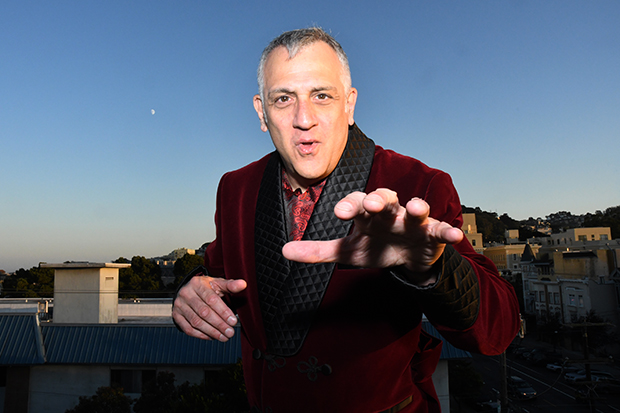The mythic origin story of punk puts the genre as a middle finger to the mainstream, born in a leather jacket with a safety pin through its nose, all the while sneering at the pop, country, arena rock, and disco of the mid-1970s. Yet, punk wasn’t always so…antisocial to these sounds. For Blag Dahlia — the frontman of Dwarves, the sardonic (and sometimes obscene) kings of the punk world – this music built the bedrock of a career that has been going strong since the mid-1980s. It’s also a career that has shown many different facets, the latest being Introducing Ralph Champagne.
Dubbed an “American humor record,” Introducing Ralph Champagne sees Blag adopt a new persona that blends together rockabilly, country, lounge, and other classic sounds of yesteryear. “Ralph Champagne is my alter ego, so I can do the old stuff,” Blag told Spin when discussing the record before its release this past Autumn. “He’s the old and good-looking version of the singer from The Dwarves. He’s sort of the logical extension of where the guy from The Dwarves gained 30 pounds and retired.”

Introducing Ralph Champagne is a way for fans of Blag and Dwarves to see what inspired these iconoclasts to start making music in the first place. “Punk rock saved my life because I needed music and I couldn’t really do the real sophisticated sh-t that I came across,” Blag told Spin. “What’s funny is that, after years of doing punk rock, I’ve figured out ways to make it more and more complex, stranger and stranger, and more sophisticated.”
While sophisticated in sound, Introducing Ralph Champagne contains the same biting wit and playful antagonism that has defined Dhalia’s career. (You can take the Blag out of the punk, but you can’t take the punk out of Blag.) With that said, while the emphasis is on humor, the musicianship is just as sharp. Blag’s different vocal crooning shows that he’s a devout student of the genres on the record, making it a welcomed addition to the secret Americana/outlaw country collection.
It’s not hard to see some of Blag’s influences on Introducing Ralph Champagne, but thanks to a playlist he made EXCLUSIVELY for HollywoodLife, fans can see the exact sonic recipe behind this new collection of songs.
Ramones, “I Don’t Care”
Blag: The Ramones were my entry into making music. Before them, I wondered how I’d ever get my ‘license’ to rock when I wasn’t very talented and was always getting into trouble. Once I heard the Ramones, a bright light switched on in my brain: THIS I COULD DO! And the more trouble I got in, the cooler it was! I Don’t Care isn’t a big crowd favorite, but the fact that they dared to make a lyric so simple that it repeated one three-word phrase over and over just blew my mind. Joey, the Heart; Johnny, the Guts; Tommy, the Brains; and Dee Dee, the Soul. The greatest rock n roll band of all time is truly the Ramones.
Frank Zappa, “Bobby Brown”
Before I knew what punk rock was, I had almost every Zappa record I could find. The way he shifted genres, moving effortlessly into rock, jazz, pop, country, funk, noise, and experimental, was ear-opening in the best possible way. “Bobby Brown” is one of the filthiest, nastiest, meanest-spirited songs ever written. My first band, Sexually Deprived Youth, performed this at a Focus on the Arts day at my high school in 10th grade. Still one of the proudest moments of my life.

Misfits, “Green Hell”
The Dwarves stole so much from the Misfits it’s mind-boggling. Danzig was the best singer-songwriter of the punk era. Green Hell is a favorite because there are so few ways to be melodic with a repetitive chord progression that’s being played way too fast, yet somehow he manages to do it. I’ve never known the words to this, and I don’t want to.
Bill Monroe, “Y’all Come”
I like old-time mountain music a lot, you can feel the authenticity from that time when actual country folks were the ones who made country records. Bill Monroe was the first one to take that style and imbue it with the blues rhythms that were starting to coalesce into R&B. Monroe wrote lots of classics including the flip side of Elvis’ first hit Blue Moon of Kentucky, and while he didn’t write Y’all Come, his version has always struck me as the purest example of the melding of blues and country that forges bluegrass.
CW McCall, “Convoy”
This was a huge hit when I was a kid, but years later, when I heard it again, it killed me for several reasons. First, it’s an epic story, second, it told me about a world I’d never thought about before, and finally, it helped me square the circle between and country and hip-hop. Blowfly knew about it way back in the days when he was inventing dirty rap, and Lil Nas X rode it to worldwide acclaim. It’s there if you know where to look! Inspired by this song, I wrote Contraband, from the Introducing Ralph Champagne LP. From one classic, another is forged!
Wu-Tang Clan, “Reunited”
Speaking of hip-hop, Wu-Tang created the system we use in the Dwarves to this day: get a huge posse, keep adding new guys, but never lose the old ones. That’s why the Dwarves just keep getting better while our contemporaries struggle to match their own mediocre records from 1995. No one makes beats like RZA, his sound is unmistakable, but this track is especially weird with its pretentious string section and combination of rappers.
GZA leads off by calmly explaining why the record you are about to hear is essential, then Ol’ Dirty busts in and makes you wonder if the whole thing is just going to fall apart any second. RZA then contributes a rare verse of his own, teeing up for Method Man to grand slam the track home with his untouchable flow. Honorable mention to my favorite Clansman, Inspectah Deck, who doesn’t appear on this track but proceeds to kill the first verse of the next song on the record, For Heaven’s Sake, sending the record careening off into yet another direction. A mind-blowing assortment of rappers, tracks, and imagery that cements WuTang as quite simply the greatest rap group of all time.

Sugarhill Gang, “8th Wonder”
When hip-hop was fun, and rappers confined their beef to wax Sugarhill Gang ruled the roost. Aside from inventing the term hip-hop and creating the first rap hit (Rapper’s Delight), they created this brilliant piece of work that spawned so many imitators it’s impossible to list them here. This is where Busta Rhymes got “Woo Hah Got You All in Check” from, as well as Kid Rock’s Dang Dang Diggy monstrosity. This song points the way toward hip-hop’s eventual total eclipse of rock music. Let’s scream, let’s shout, let’s turn this function out.
Alicia Bridges, “I Love the Nightlife”
Disco gets a bad name, but my mom sure loved it, and I heard this song about a thousand times before I realized how brilliant it was. The lyrics are cynical in the verses and positive in the chorus, the beat is infectious, and her voice stands up with the best soul and R&B divas of all time. The rest of the LP is great, too, though it’s largely been lost to the mists of time. When people say ‘one hit wonder,’ I always wonder why that’s an insult. I’m a fucking genius and never made a hit! Yet…
Jackson 5, “ABC”
Along with “Sugar Sugar” and “Yummy Yummy Yummy,” this is one of the first songs I ever heard on the radio as a kid. Instantly infectious with an unbeatable pop lyric, this is a prime example of why in songwriting, simple is usually better. You know this song, you love this song, admit it!
The Sonics, “He’s Waiting”
The Sonics are ground zero of punk rock. Harder than all of the British invasion groups, including the Kinks and the Who, they typify the 60’s garage band ethic. Play a lot of Little Richard and James Brown songs in your set, then write something original the night before you go into the studio because you really just want to cover Little Richard and James Brown. While the UK-based Beatles were releasing “Do You Want To Know a Secret,” the Seattle-based Sonics put out this instant classic about a wayward girl sentenced to an eternity with the Dark Lord. I had a chance to sing this live with the band a few years ago in Portland, a bucket list moment I’ll cherish forever.
Johnny Burnett & the Rock n Roll Trio, “Train Kept a Rollin'”
To those who say that the R&B original is always better than the Rock & Roll cover, I point you to the definitive version of this song, made famous by the always anemic Aerosmith and tons of other even lesser bands. No version, including Tiny Bradshaw’s original, ever came close to the sheer power exhibited here. Burnett’s vocal shreds like no hit 50’s vocalist ever did, but it’s Paul Burlison’s insane guitar lead that points the way to the future.
Johnny Marvin, “Me and My Shadow”
This might be hard to find on modern streaming platforms, and there are countless versions of this song, but this early jazz-era version kills me every time. From the spare ukulele rhythm, to the mournful clarinet solo, but it’s the lyrics that really grab you here. No song better sums up the loneliness of the human condition than this one. But it’s got to be this version!
Fred Astaire, “Cheek to Cheek”
Irving Berlin is the most brilliant and prolific songwriter of the golden age of American pop. This song is perfectly constructed lyrically, from its opening phrase, “heaven I’m in heaven,” to its playful bridge about “fishing in a river or a creek,” to its dramatic minor chord exhortation to “dance with me, I want my arm about you, the charm about you will carry me through,” right back to “heaven, I’m in heaven.” As my dad might say, they just don’t write them like that anymore. I love the more jazzy Boswell Sisters version too, but Astaire’s smooth delivery and flawless moves make this the perfect marriage of dance and song.


